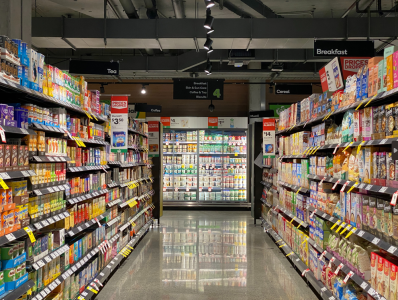Could Coles and Woolworths' new surveillance tactics backfire? Here's what experts say
A spike in brazen shoplifting and violence saw Australia's leading supermarkets fighting back with new high-tech surveillance measures.
However, experts now warn these ‘Orwellian tactics’ could erode consumer trust and even encourage more petty theft.
Shoplifting in Australia has reached new proportions. Liquor stores, chemists and supermarkets experienced astronomical rises in theft over the past two years. It was also reported that the industry incurs $9 billion in losses yearly due to theft.
Coles has seen a 20 per cent increase in retail crime nationwide.
Emboldened bands of shoplifters brazenly raid stores, sweeping armloads of hot ticket items like meat and baby formula straight into bags.
Checkout theft is also rampant, with many simply walking out without paying after 'forgetting' to scan items.
Violence against retail staff trying to intervene has also escalated alarmingly.
To combat this crime wave, stores have increased surveillance to track every customer's move.
Overhead cameras monitor each aisle, while enhanced AI technology tracks scanning at checkout. There are new 'smart' lock gates that automatically close if someone tries to bolt without paying.
Some stores even equipped staff with body cameras, like those worn by police.
But experts argue this surge in surveillance could backfire by eroding consumer trust.
‘Nine times out of ten, most shoppers are doing the right thing,’ Consumer Psychology Expert Professor Nitika Garg of the University of New South Wales Business School said.
'A sense of trust is lost when supermarkets increase surveillance with little explanation,' she added.
She explained that people have a ‘natural psychological reaction’ when they feel that their freedom is being limited or curtailed.
'No one likes to be watched. Cameras impinge on our privacy. We, as consumers, are unsure of how that data is being used. Not having an explanation or little reassurance adds to the negative reaction,' Professor Garg shared.
She said that instead of discouraging shoplifting, it may actually encourage others to steal.
‘This is a consequence of psychological reactance; it pushes people to do the opposite of what they are told,’ she continued.
She also mentioned that the enhanced security measures are particularly grating since major supermarkets nationwide have reported record profits, with Coles earning $1.1 billion and Woolworths earning $1.62 billion in 2022-2023.
While increased security cameras will likely reduce theft, consumers may abandon stores if they feel too uncomfortable. At the very least, Professor Garg suggested chains explain the need for extra surveillance and conduct public campaigns.
‘This will help,’ she remarked.
You may watch 7News Australia’s report here:

What’s your take on this story, members? Share your thoughts in the comments below!
However, experts now warn these ‘Orwellian tactics’ could erode consumer trust and even encourage more petty theft.
Shoplifting in Australia has reached new proportions. Liquor stores, chemists and supermarkets experienced astronomical rises in theft over the past two years. It was also reported that the industry incurs $9 billion in losses yearly due to theft.
Coles has seen a 20 per cent increase in retail crime nationwide.
Emboldened bands of shoplifters brazenly raid stores, sweeping armloads of hot ticket items like meat and baby formula straight into bags.
Checkout theft is also rampant, with many simply walking out without paying after 'forgetting' to scan items.
Violence against retail staff trying to intervene has also escalated alarmingly.
To combat this crime wave, stores have increased surveillance to track every customer's move.
Overhead cameras monitor each aisle, while enhanced AI technology tracks scanning at checkout. There are new 'smart' lock gates that automatically close if someone tries to bolt without paying.
Some stores even equipped staff with body cameras, like those worn by police.
But experts argue this surge in surveillance could backfire by eroding consumer trust.
‘Nine times out of ten, most shoppers are doing the right thing,’ Consumer Psychology Expert Professor Nitika Garg of the University of New South Wales Business School said.
'A sense of trust is lost when supermarkets increase surveillance with little explanation,' she added.
She explained that people have a ‘natural psychological reaction’ when they feel that their freedom is being limited or curtailed.
'No one likes to be watched. Cameras impinge on our privacy. We, as consumers, are unsure of how that data is being used. Not having an explanation or little reassurance adds to the negative reaction,' Professor Garg shared.
She said that instead of discouraging shoplifting, it may actually encourage others to steal.
‘This is a consequence of psychological reactance; it pushes people to do the opposite of what they are told,’ she continued.
She also mentioned that the enhanced security measures are particularly grating since major supermarkets nationwide have reported record profits, with Coles earning $1.1 billion and Woolworths earning $1.62 billion in 2022-2023.
While increased security cameras will likely reduce theft, consumers may abandon stores if they feel too uncomfortable. At the very least, Professor Garg suggested chains explain the need for extra surveillance and conduct public campaigns.
‘This will help,’ she remarked.
You may watch 7News Australia’s report here:
Key Takeaways
- Major supermarket chains in Australia have introduced new surveillance measures to combat the surge in shoplifting.
- A consumer behaviour expert warns that these step-up measures may lead to a loss of customer trust in brands and could ironically incite more theft.
- Customers have raised concerns about the surveillance measures, particularly the positioning of overhead cameras that could potentially expose their personal information.
- Professor Nitika Garg from the University of New South Wales Business School suggested supermarkets publicise a campaign to explain the new changes, as increasing surveillance without clear explanations can trigger negative reactions.
What’s your take on this story, members? Share your thoughts in the comments below!








